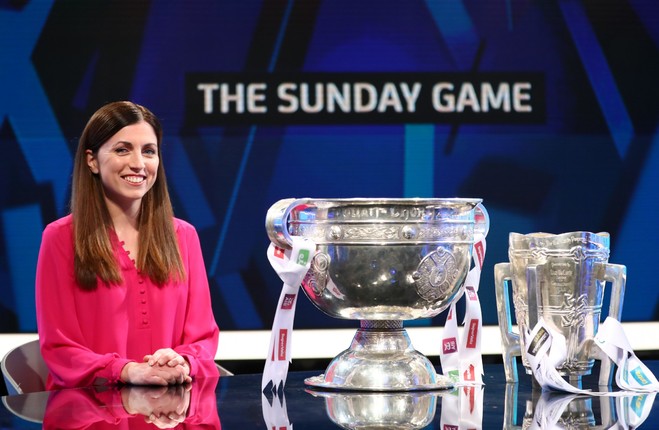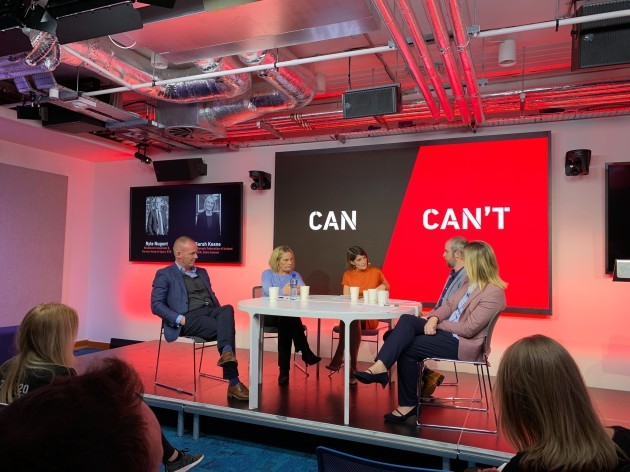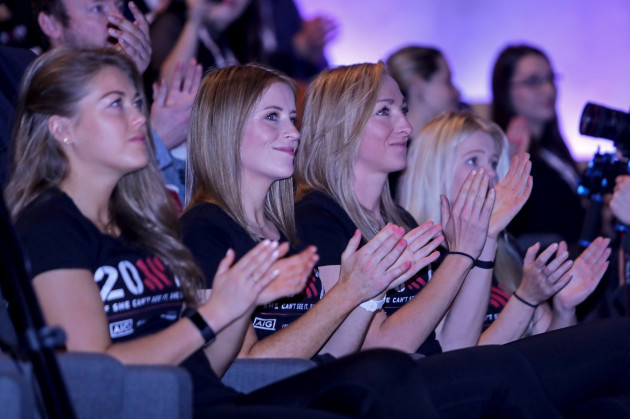JOANNE CANTWELL LANDED her role as The Sunday Game’s presenter because “she was the best person for the job” while there were several other female candidates considered, former Head of RTÉ Sport Ryle Nugent said today.
Cantwell succeeded long-standing anchor Michael Lyster in the hotseat ahead of the 2019 GAA season, after it was announced last February that the experienced reporter would take over.
Speaking at the 20×20 Can/Can’t Debate in Dublin today, Nugent revealed that of the four candidates RTÉ ultimately chose as potential successors to Lyster, three of them were female.
That disclosure came about as gender quotas came up in conversation.
“Joanne Cantwell was presented as the lead presenter of The Sunday Game,” Nugent explained on a panel with President of the Olympic Federation of Ireland and CEO of Swim Ireland, Sarah Keane, 12-time All-Ireland winner and CEO of the Federation of Irish Sport, Mary O’Connor, and former Irish Sportswriter of the Year, Ewan MacKenna.
And I heard some whispers, ‘She only got it because she was a woman, and there’s a movement…’ The most disrespectful thing I’ve heard said about a journalist I’ve worked with over a decade.
“She got the job because she was the best person for the job. We spent a long time over a decade preparing to have the right journalist in the room that, when they were qualified, would be in a position to take on the job. That goes for Joanne, Evanne [Ni Chuilinn], Jacqui Hurley, Clare [McNamara].
“We had loads of options. In the end, there were four people that we were thinking about and three of them were women. Just by accident.”
Nugent brought up the point of gender quotas himself, before being challenged by MacKenna and ultimately telling that story.
“It comes back to the five stakeholders I talked about at the beginning – athletes, media, federations, public and sponsors — it’s the engagement of women in all parts of those stakeholders,” the rugby commentator said.
“Then it takes up, and it’s lurking the back of my head, that issue of quota and whether enough women are involved — and if they’re not, should it be imposed?”
Nugent referred to former Minister of State for Sport Patrick O’Donovan’s stance on the need for gender quotas in sport, before sharing his own thoughts:
“I would have started out six or eight years ago being utterly opposed to gender quotas,” he said. “I would have been opposed to them on the basis that it is absolutely unfair to women who are successful, because then what happens is people start to say, ‘She’s only there because she’s woman’, and I think that is deeply unfair and wrong.
“At the end of my eight-year tenure at RTÉ as the Head of Sport, I would have been under certain circumstances, extreme circumstances, position of last resort in favour of quotas. Because I think it is the only way ultimately that some people can be shifted from their… I’ll call it neanderthal thought process of how things will progress without women in the room. They need to have it forced upon them.”
MacKenna interjected: “There’s the flip side of that though: instead of looking at an analyst, a presenter, a broadcaster or a narrator, you’re looking at a female analyst… That’s the way you see them.”
Nugent then told The Sunday Game presenter story.
“If women want to be in positions of influence, women have got to put themselves forward for positions of influence,” Keane also noted.
“If people want their profile to be raised, people have got to be willing to talk about themselves and put themselves on the line in the bad times as well as the good times, which to be fair, a lot of our sportswomen have been prepared to do.
Sport is about so much more than the skills that are taking place on the pitch. We’ve got to stand up and be counted, and take our opportunities.
***
BY 2030, WOMEN in sport can/can’t become part of our cultural DNA in the way men’s sport currently is.
That was the opening statement up for discussion at the debate at Facebook HQ this morning. Editor of TheJournal.ie, Sinead O’Carroll, moderated an interesting and balanced debate, which left everyone with plenty of food for thought.
Nugent and Keane discussed the ‘Can’ side of the argument, while O’Connor and MacKenna said ‘Can’t’.
“There is no such thing as equality in sport for me full stop. Take gender out of it and men’s sport is not equal,” Nugent noted early on. “Whether you are a Dublin footballer, Manchester United centre-back or a corner-forward for the Leitrim hurling team, it isn’t fair and equitable.
“The same effort goes in from all the individual athletes, but the same recognition and success isn’t forthcoming. Can it be equal? You’ve got to put a very big asterisk that says there is no equality in the first place.
“What I think we are looking to achieve and what I think can be achieved is a very clear pathway for women’s sport to be exposed and given the opportunity that men’s sport is currently exposed to and given the opportunity to be.”
“You can’t force people to like things,” MacKenna later mentioned. “You can’t say you have to like this because it’s women or men. People will make their choices.
This won’t be popular, but I just wonder, is some of it biological. If people want stronger, faster, higher, that’s just science. They’re going to get that on the male side of it.
O’Carroll interjected, stating if people want stronger, faster, higher, then they would never go to see two mid-table Premier League teams lock horns.
“Fewer do go,” MacKenna agreed. “Fewer go to the League of Ireland than the Premier League because they want to see the best. I’m not saying women, skill-wise, can’t reach that, I’m just saying physiologically there’s an issue.”
Then, Nugent stressed the need for a shift of attitude.
“I think part of the challenge of this entire process is a rewiring,” he said. “It is a rewiring of the public’s attitude towards looking at sport in general.
“If you are going to a rugby game expecting the women to hit as hard as the men, to run as fast, then you’re going to be ultimately disappointed.
But I will say this: I have watched Claire Molloy play openside flanker for Ireland for the last four or five years, she is outstandingly good at what she does. She’s not as strong as Josh van der Flier, she’s not as fast as Josh van der Flier, but her ability to read a game is as good, if not better.
“That’s programming yourself to watch it in a different way. And that’s part of this exercise: it’s equity, from the grassroots up. Give the same opportunity and don’t expect the same things.”
While O’Connor was, as she says ‘a positive realist’ throughout, Keane best summed up the conclusion of the panel at the end:
“Can we make people care about women’s sport? Yes, we can. Do we have to be realistic about it? Yes we do.”
The42 is on Instagram! Tap the button below on your phone to follow us!



